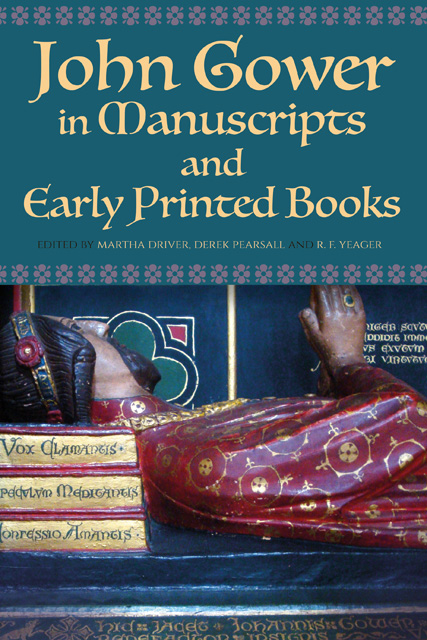8 - John Shirley and John Gower
Published online by Cambridge University Press: 18 January 2023
Summary
The fifteenth-century scribe John Shirley (c.1366–1456) presents the following poem as a moral balade written by John Gower:
Shirley furnished the poem with the title “Balade moral of gode counseyle,” and a running header which repeats the same information: “Balade of moralite,” in both instances then concluding with the clear attribution of authorship: “made by Gower.” He copied the poem into the latest of his three extant manuscript anthologies, Oxford, Bodleian Library, MS Ashmole 59, where it sits amidst a cluster of items that are otherwise all by Lydgate: three extracts from the Fall of Princes precede it, and five short poems follow, two of which are verse prayers. Most of this material has a moralizing intent and “Passe forþe þou pilgryme,” with its counsel against hasty or unguarded speech, fits easily into a selection of short admonitory items which Shirley describes, slightly opaquely, as “þe abstracte brevyayre” (fol. 13r). In this context, were the poem not so clearly labelled as Gower’s it could pass for one of Lydgate’s. Its sentiments are in tune with those expressed in Lydgate’s proverbial pieces such as “A wikked tong wol alway deme amis” (NIMEV 653), and it accords with the advisory nature of much of his work. Another selection from the Fall of Princes that occurs later in this same manuscript is given the almost identical title “Balade of Good Counseyl.” In Shirley’s earlier anthology, Cambridge, Trinity College, MS R.3.20, a copy of Lydgate’s “Thoroughfare of Woe” (NIMEV 1872) is also introduced as “a balade of goode counseyle” (p. 25), and equivalent titles, in French not English, are attached to other short poems: “Balade de bone counseyle” is used as the title of two poems, one English, one French, and another French poem is entitled “Balade moral et de bone conseylle.” Chaucer’s poem “Truth” is also sometimes titled “Balade de bon conseyl” (and with the equivalent terms in English and Latin), though not by Shirley, who copied it twice in the Trinity manuscript. Similarly, in Bodley Ashmole 59, Shirley introduces Henry Scogan’s poem, “My noble sones and eke my lordis dere,” as “A moral balade.”
- Type
- Chapter
- Information
- John Gower in Manuscripts and Early Printed Books , pp. 153 - 166Publisher: Boydell & BrewerPrint publication year: 2020

